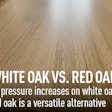So we're back with our guest blogger, Scott Avery, of our Contractor Blog, talking about "what is green" to a contractor. (See our post last week about job-site finishes here.)
So Scott, how important do you think "green" is to your customers? On a scale of 1-10? And where does it rank again price or appearance?
Scott: Most people who have hired us generally are seeking value in a project by having long-lasting floors. They don't really request things being "green" because the word became sort of clichéd for intelligent consumers about four to five years ago. Customers tend to listen to our suggestions, because I approach everything thinking about LCA first and pricing comes afterwards.
What do you do if your customer says they are focused on being "green," but are making what you consider to be poor green decisions?Scott: I generally present the pros and cons of the decision and leave it in their hands based on realistic expectations. If the project is just a bunch of smoke and mirrors, then I will pass and let someone else handle it. It works out a lot better because you develop a consistent like-minded base of thoughtful customers instead of those easily swayed by false marketing claims.
Do you have any tricks to keep a job site green? Dust catching systems? Something you can recycle or do to minimize waste? Any cleanup tips?
Scott: Dust collection systems are more or less for our benefit, but I think any contractor who seeks to be competitive these days needs to be conscious of dust. Because we sanded a lot of floors in Portland where the houses are older, we tried to approach sanding delicately and preserve the floor. Often I would talk people into restoring what they had when it made sense instead of a full replacement with new flooring or carpet. If you look at the trash pile remaining after a 700-square-foot refinish, it is certainly dwarfed by the trash from simply changing out carpet, plus the dust is compostable (unless it has lead). With that in mind, I feel like anyone who is refinishing floors under carpet is doing a good thing for the environment.
How important is LEED to you or your customers?
Scott: We never ran into LEED because we were heavy residential remodeling and never did projects where LEED was a factor, so I'm not able to answer. What I tend to notice, though, is that because LEED projects are driven by the architect, there is little opportunity for product input from the contractor by the time you are involved in most cases.
Does your average customer care about FSC?
Scott: We would occasionally be asked for FSC products and would provide the materials when it was necessary. What I found often was that once you point to the additional cost of many FSC-certified products, the importance of FSC falls in priority for a residential customer. Often when I would present products that may have had sustainable harvesting in place but would lack an actual certification, their ears would perk back up due to the lower cost and similar value.
Does your typical customer know about Lacey?
Scott: I used Lacey as more of a discussion point to explain how the closed loophole had applied pricing pressure to exotics. So the customer wouldn't actually ask about the Lacey Act, but it would be a useful tool later in illustrating hardwood market dynamics and why adding Brazilian cherry floor in the living room was going to cost $1 square foot more than last year.
Does your typical customer ask about formaldehyde? And if so, how do you answer them?
Scott: Few people talk about formaldehyde. We very rarely install engineered flooring, so it wasn't a big issue. Occasionally if we needed to use a conversion varnish, someone may ask about it because some contractors would misinform consumers about the levels within the product. We would clarify the misconception using MSDS data and educate the consumer on the difference between free and bound formaldehyde once the finish coat was dried. As you know, formaldehyde is one of these trigger points for consumers that is less relevant to a bigger picture of health, such as a balanced diet, exercise, and not living next to a toxic waste dump.
Scott, thank you so much for talking green with me. I learned a great deal, and there are some super tips in these posts. Come back anytime!
































